
By Chimezie Godfrey
The Electoral Hub, a Civil Society Organization has tasked legislators on electoral bill that allows INEC the discretion to conduct election administration in line with its capacity and practicalities on election day.
In a statement, the Executive Director, Electoral Hub’, Princess Hamman-Obels stressed that the mode of elections should be solely determined by INEC, as the primary electoral umpire, which includes both voting and results transmission.
She added that if INEC decides to do conduct voting and/or results transmission electronically or manually, it should be able to do so without interference.
She pointed out that INEC has demonstrated capacity to transmit results electronically, as shown by the use of the results viewing portal during the 2020 Edo and Ondo governorship elections, and introduction of the Biometric Voters Accreditation System (BVAS).
According to her the BVAS will serve the triple function of registering voters, accrediting voters, and transmitting results, adding that it was successfully piloted during the Isoko South I Constituency by-elections for the Delta State House of Assembly.
She therefore urged that the Bill should ensure that INEC is given the unfettered discretion to determine the mode of elections, as this is a purely administrative matter.
Hamman-Obels also stressed that INEC’s power to review results declared under duress should be retained, while urging the legislators to adopt language that is not too restrictive.
She said,”NEC’s power to review results declared under duress should be retained. Based on previous experiences, we have seen that this power is important to prevent candidates from stealing the mandate and coercing Returning Officers to announce results that are favourable to them.
“The power to review results declared under duress is also in line with INEC’s constitutional mandate to “organise, undertake and supervise all elections” (Paragraph 15(a), Third Schedule to the 1999 Constitution of Nigeria).
“In terms of drafting of the Bill, legislators should adopt language that is not too restrictive. This is based on the recognition that too much specificity might serve as stumbling blocks to election. administration. For example, giving legal recognition to Smart Card Readers only might create problems if another device, such as the BVAS, is used.
“Similarly, giving INEC the legal mandate to use technological devices alone means that there might be problems if for any reason the Commission has to revert to manual methods.
“We therefore propose flexible language that gives INEC the discretion to conduct election administration in line with its capacity (both financial and technical), and practicalities on election day.
“Now that the National Assembly has returned from recess, we urge them to harmonise the Bill and pass a consolidated version passed latest by October 2021 so that the Bill can be assented to by the President before next year.
“We strongly urge the National Assembly and the President to stick to these timelines to give INEC sufficient time to implant, internalise, and implement the Act in smaller elections before the 2023 general elections.
“We advise that passing the Bill in 2022 will be too close to the 2023 elections. All efforts must therefore be made to pass the Bill this year and prevent last-minute changes to the law.”
Hamman-Obels lauded the ninth National Assembly for drafting the electoral bill while urging it to ensure that the bill passes integrity test for to be impactful.
“We commend the ninth National Assembly for its rigorous efforts in drafting the Electoral Act Amendment Bill 2021. For these efforts to be impactful, the Bill must both meet the integrity test and be passed in a timely manner.
“We urge the National Assembly during the harmonisation process to take the issues of mode of elections, election expenses, results declared under duress, drafting, and timelines into account. In this way, a sound electoral legal framework for the 2023 general elections will be guaranteed,” she stated.
Hamman-Obels noted that the current limits on election expenses in the Electoral Bill are far too high and pose a risk of elections being won by the highest bidder.
She therefore urged the National Assembly to put more modest fees to ensure that elections are not completely monetised
She also expressed concern that the drastic increase in election expenses will have a disproportionate effect on minorities like women, youth and persons with disabilities who typically have less access to funding and sponsorship than their counterparts, adding that it is therefore necessary to reduce the limits on election expenses to ensure a more equitable process.
The Electoral Hub is a multidisciplinary strategic think tank committed to strengthening electoral governance, and accountability in Nigeria. The Electoral Hub works to enhance electoral integrity and credibility through research, documentation, electoral education, policy and legal influencing, and impact advocacy.
The main focus of The Electoral Hub’s intervention in the electoral governance process is on complementing the roles and activities of the different institutions, stakeholders and drivers of the electoral process by providing back-end support services to them. Since its establishment, The Electoral Hub has grown into a leading research, knowledge and advocacy hub with the capacity to conduct ground-breaking research and analysis of electoral issues.




